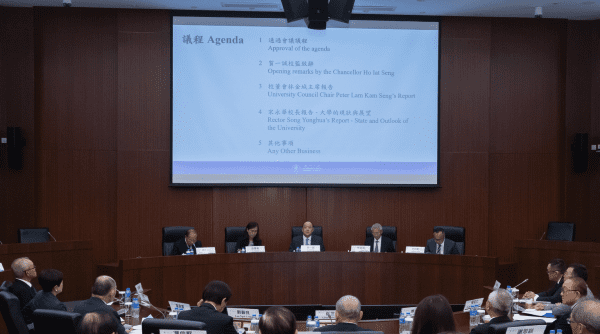News Express: UM holds UAUC joint meeting; Ho Iat Seng: nurture more talent who love China and Macao
新聞快訊:澳大舉行大學議庭及校董會聯席會議 賀一誠冀大學培養更多愛國愛澳人才

賀一誠主持澳大大學議庭及校董會聯席會議
Ho Iat Seng presides over the UAUC joint meeting
澳大舉行大學議庭及校董會聯席會議 賀一誠冀大學培養更多愛國愛澳人才
澳門大學2022/2023學年大學議庭及校董會聯席會議在6月29日於澳大何賢會議廳舉行,並由澳門特別行政區行政長官、澳大校監兼大學議庭主席賀一誠主持。他強調,要深入學習貫徹習近平主席最近對澳門高校和科技工作者重要回信的精神,務實推進科技創新和成果轉化,培養更多愛國愛澳優秀人才。
賀一誠校監從四個方面分享他對澳大未來的期望。在切實提升人才培養水平方面,他希望澳大主動發揮帶動作用,開辦更多和重點產業相關的課程,為澳門長遠發展提供人才保障;同時澳大應作為連接非高等教育的橋樑,為中小學教師進行培訓,推出科創人才的培養計劃,支持特區政府從非高等教育開始提早培養本地各類綜合人才。在賦能澳門“1+4”適度多元發展方面,校監寄語澳大應以更強的使命感和緊迫感,以實際行動加快科研可轉化成果的進展。發揮國家給予的利好優勢,整合澳門與內地科技創新要素協同發展,加強與大灣區高校及機構的創新研究和技術研發,加快科研成果在大灣區轉化。同時,藉着深合區的發展機遇,為國家和特區在培養人才和開展重點科研工作方面作出更大的貢獻。
在加大國際化及市場化發展力度方面,大學應加強與國際知名高校合作開辦更多具吸引力的課程,令更多海外生來澳就學,並增加本澳學生到不同國家或地區交流的機會。另外,期望大學加大力度推出相應的研學交流、科研培訓、學術會議等,提升大學的學術涵養,發揮宣傳澳門的角色。與此同時,澳大要積極運用自身的學術力量,支援特區政府落實梯隊人才培養規劃,加強對中華文化的研究及推廣,強化澳門社會特別是青年對國家的認識和文化認同。在完善大學管理體制方面,隨着澳大辦學規模日益增大,在資源的分配及運用上應秉承廉潔與高效的文化,就行政治理及財務管理方面建設完備的監管體制,以優化資源配置、加強成本管控、提升行政效率及效益為目標,繼續踐行勤儉辦學,發揮每一分資源的效益。
澳大校董會主席林金城總結了今屆校董會的工作重點。他表示在推動產學研進程方面,校董會注重引進社會的參與,加快科研成果與市場對接,近年部分由大學支持孵化的企業已進入穩定發展期。澳大會繼續厚植創新創業發展土壤,加大科研創新項目的能見度。此外,大學配合特區政府“1+4”適度多元發展策略的人才需要,新增多個學位課程,擴大辦學規模,持續優化大學的軟硬件環境。
澳大校長宋永華表示過去數年大學在學生規模、學術水平和國際聲譽上均有所提升,去年着力完善人才培養模式和學科融合,配合特區發展定位,培養社會發展所需人才;加快建設國際和區域重大科研平台,完善產學研和成果轉化機制。此外,宋永華亦介紹了澳大在拓展與國際及內地高校合作的情況。在下一階段,大學將積極完善行政及財務管理體制,持續建設及發展校園,不斷優化澳大在教學、研究、對外合作、社會服務、行政管理等方面的具體工作。
多位與會者亦就研究生培養模式、吸引國際生的策略、學科佈局和發展等方面進行深入討論。出席是次聯席會議的還有社會文化司司長歐陽瑜、澳大大學議庭及校董會成員、澳大相關部門代表等。
欲瀏覽官網版可登入以下連結:
https://www.um.edu.mo/zh-hant/news-and-press-releases/presss-release/detail/55914/
UM holds UAUC joint meeting; Ho Iat Seng: nurture more talent who love China and Macao
The University of Macau (UM) held the Joint Meeting of the University Assembly (UA) and University Council (UC) for the 2022/2023 academic year in its Ho Yin Conference Hall on 29 June. Ho Iat Seng, chief executive of the Macao SAR, chancellor of UM, and chair of the UA, presided over the meeting. He stressed the need to learn and implement the spirit contained in President Xi Jinping’s letter of reply to higher education institutions and science and technology workers in Macao last month, promote technological innovation and commercialisation of research results, and nurture more outstanding talent who love China and Macao.
The chancellor expressed his expectations for the future development of UM in four areas. In terms of enhancing talent development, he expressed hope that the university would take the initiative to offer more programmes related to key industries, so as to build a sustainable talent pool for Macao’s development in the long run. The university should also serve as a bridge connecting non-tertiary education, provide training for primary and secondary school teachers, and launch training programmes to nurture talent in technological innovation, in order to support the SAR government in the early development of local talent starting from non-tertiary education. In terms of empowering Macao’s ‘1+4’ strategy of economic diversification, the chancellor said that the university, with a stronger sense of mission and urgency, should accelerate the progress of commercialising research results through practical actions. The university should also capitalise on the advantages offered by the country, integrate the elements of technological innovation between Macao and mainland China for coordinated development, strengthen collaborations with universities and institutions in the Guangdong-Hong Kong-Macao Greater Bay Area in innovative research and technology R&D, and accelerate the commercialisation of research results in the Greater Bay Area. In addition, the university should take advantage of the development opportunities offered by the Guangdong-Macao In-depth Cooperation Zone in Hengqin to make greater contributions to the country and the SAR by nurturing talent and undertaking key research projects.
In terms of increasing the degree of internationalisation and marketisation, the university should strengthen collaboration with internationally renowned higher education institutions to offer more attractive programmes, so as to attract more international students to study in Macao, and provide more opportunities for local students to go on exchange to other countries or regions. In addition, he expressed hope that the university would increase efforts to hold more research and academic exchanges, research training, and academic conferences to improve its academic quality and play a role in promoting Macao. The university should also actively make use of its academic strength to support the SAR government’s talent development plan, and step up efforts in the research and the promotion of Chinese culture to enhance the understanding of the country and cultural identity of the Macao community, especially young people. In terms of enhancing the university’s management system, as the university continues to increase its faculty size and student numbers, it should adhere to the culture of integrity and efficiency in the allocation and use of resources, and establish a comprehensive supervision mechanism for administrative governance and financial management, with the aim of optimising resource allocation, strengthening cost control, and improving administrative efficiency and effectiveness. The university should continue to practise frugality so as to make the most of the resources.
UC Chair Lam Kam Seng Peter summarised the work of the UC over the past few years. According to him, in terms of promoting industry-academia collaboration, the UC has been focusing on bringing in social participation to facilitate the matching between research results and potential business partners, and some of the companies incubated by UM in recent years have entered a stable development phase. The university will continue to foster an environment conducive to innovation and entrepreneurship, and to raise the profile of research and innovation projects. In addition, the university has launched a number of new degree programmes, expanded its faculty size and student numbers, and improved its hardware and software environment in order to meet the demand for talent as required under the SAR government’s ‘1+4’ strategy for economic diversification.
UM Rector Yonghua Song said that in recent years, UM has expanded its student body, and its academic standing and international reputation have seen improvement. Over the past year, the university has focused on enhancing its talent development model and interdisciplinary integration to meet the SAR’s development positioning and cultivate the talent needed for social development. The university has also accelerated the establishment of major international and regional research platforms to improve the mechanism for industry-academia collaboration and the commercialisation of research results. In addition, Song also outlined UM’s efforts to establish cooperation with international and mainland higher education institutions. In the next phase, the university will actively enhance its administrative and financial management systems, continue to develop its campus, and increase its efforts to optimise teaching, research, external cooperation, community services, and administration.
Participants also held in-depth discussions on other topics such as postgraduate training models, strategies for attracting international students, and the layout and development of disciplines. Attendees of the joint meeting also included Secretary for Social Affairs and Culture Ao Ieong U, UA and UC members, and representatives of relevant departments of UM.
To read the news on UM’s official website, please visit the following link:
https://www.um.edu.mo/news-and-press-releases/press-release/detail/55914/